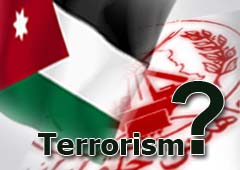Encampment of MKO, after its expulsion from Iraq, in France and other European countries as well as the United State of America for the reasons discussed is out of the question. The next option, then, might be the region Arab countries, Latin America and the continent Africa.
Jordan, because of its strategically geographical location, seems to be of undeniable priority for MKO; Iraq is the sole country that separates Jordan from Iran. Naturally an opportunist group, MKO made attempts to establish close relations with Jordan prefiguring it as the alternate option after Iraq and Rajavi had repetitive meeting with King Hussein of Jordan. Even before Rajavi’s flight to Iraq, he met with King Hussein when he was on a visit in France. The meeting was said to have been arranged by Saddam. Although King Hussein was a figure of disrepute among the left groups and MKO in particular, it was so important a matter for Rajavi to establish relations with him as a prospective patron since King Hussein and Saddam were close alliances. However, all these expectations and anticipations have proved to be fruitless since Jordan has utterly rejected to grant asylum to members of MKO.
Jordan and Iran restored diplomatic ties in the early 1990s after the two states severed their relations in 1980 following the outbreak of the eight-year Iran-Iraq war and the King Abdullah paid an historic visit to Tehran in September 2003. In September 2007 some news reports broke that Jordan had granted asylum to members of MKO. Immediately, Nasser Judeh, the Jordanian government Spokesperson, acted in response that the Kingdom did not receive any leader or member of Mujahedin-e Khalq, and does not allow the organization to operate on Jordanian soil”. He reiterated that His Majesty King Abdullah was determined to build brotherly relations between the two countries based on mutual respect and understanding and that, Jordan never consented to grant asylum to a terrorist group which was harbored by the former Iraqi regime and was designated as a terrorist organization by the US, Canada and the EU.
Syria, maintaining a long, friendly relationship with Iran even in the course of Iran-Iraq war, is already an impossible option. The case of two MKO members, Ebrahim Khodabandeh and Jamil Bassam, who were arrested and returned to Iran from Syria in 2003, well indicates that the country is in no way a safe haven for members of MKO.
In respect to other Gulf region countries, Bahrain, Qatar, they prefer not to be engaged in the issues that might generate further tension between them and Iran. Besides, Iran’s sovereignty over the Persian Gulf actually paralyzes any move by the group’s so-called liberation army in the embryo.
At the first look, Latin America, because of a variety of scattered active militia and guerrilla groups, might seem an appropriate option. But it should be noted that a number of Latin countries have come to enjoy periods of peace and tranquility after long periods of various revolutions and opposition conflicts. They need peace to reconstruct their countries and avoid whatever might lead to the escalation of any tension. Latin America is politically divided into two groups of countries and territories; ruled under dictatorial militarism and independant revolutionaries. The former countries absolutely disapprove military and terrorist groups since the presence of any alien opposition that might collaborate with the internal opposition builds up a potential threat against the ruling power. Significantly, MKO has long been under the influence of the Latin theoreticians of the urban and rural guerrilla warfare. Besides, MKO’s natural potentiality to enter any illegal and underground trade in union with other active professional smugglers and gangs worsens the problem these countries can hardly overcome at the present.
The second group of countries are stabilized through revolutions and have developed close political and economic ties with Iran. Regardless of their ties with Iran, traumatic effects of revolutions need peace and tranquility to be healed and consequently, any equivocal move is under severe surveillance. For sure, an alien group that is a globally blacklisted terrorist organization can never be trusted to be granted asylum by these countries; a number of these countries are already facing allegations of harboring terrorism and of course, any sign of favor shown for MKO works as evidences against them.
The next only option, then, is Africa. The settlement of the organization in Africa, provided that any country there let it in, is equal to absolute political isolation. Relocation of MKO to any African country means political suicide of an organization that considers itself as the vanguard of a democratic move to liberate not only Iranian people but the mankind in general. The abject misery of being expelled to African countries, after living seemingly glorious days in European countries, is too much for MKO to endure and the group never consents to encamp in African countries.
Considering that there is no option for MKO after Iraq, the question is what is the appropriate solution for Mojahedin to save their organizational structure and entity? No doubt, Mojahedin necessarily have to change their tune and before anything, they need to have another internal revolution in all aspects of organizational structure, ideology, strategy, and leadership. The first rational move will be reconsideration of two alternative options; either dissolve the organization and let the members free or reorganize a logically democratic struggle. The options have to be discussed in detail.


